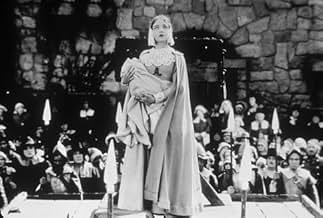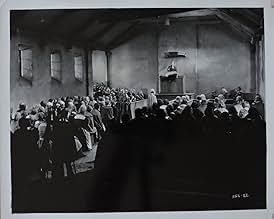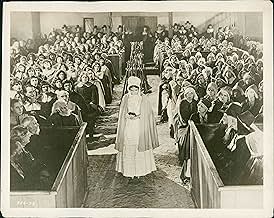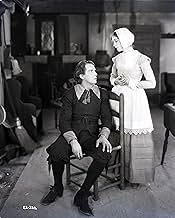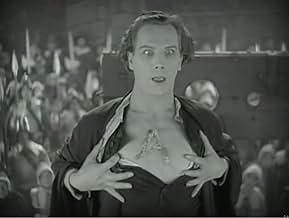CALIFICACIÓN DE IMDb
7.6/10
2.1 k
TU CALIFICACIÓN
Tras tener un hijo fuera del matrimonio, una joven puritana es presionada para que revele el nombre de su amante.Tras tener un hijo fuera del matrimonio, una joven puritana es presionada para que revele el nombre de su amante.Tras tener un hijo fuera del matrimonio, una joven puritana es presionada para que revele el nombre de su amante.
- Dirección
- Guionistas
- Elenco
- Premios
- 1 premio ganado en total
Buck Black
- Child in crowd
- (sin créditos)
Nora Cecil
- Townswoman
- (sin créditos)
Iron Eyes Cody
- Young Indian at Dunking
- (sin créditos)
Artye Folz
- Child
- (sin créditos)
Dorothy Gray
- Child
- (sin créditos)
Douglas Haig
- Minor Role
- (sin créditos)
Betsy Ann Hisle
- Child
- (sin créditos)
Opiniones destacadas
10Doug-193
Exactly what we've lost since the end of the silent era is magnificently on display in Victor Seastrom's THE SCARLET LETTER: shimmering black and white photography of superbly composed and paced scenes capturing the essence of the American classic novel by Hawthorne, though certain details of the story have been altered and may annoy literary purists. This is not the novel but a separate work, more than a perceptive and intelligent picturization. Here is the great, lost art of silent screen acting, with Lillian Gish, unforgettable as Hesther Prynne, leading an accomplished cast. The result is pure visual poetry.
Victor Sjöström's The Scarlet Letter is a masterpiece. It should be put on DVD for all to enjoy, even if parts of the film have to be supplemented with 16mm dupes. TCM hasn't shown it in years, yet they show The Wind several times every year. It makes no sense. The Scarlet Letter is even better than The Wind. It should be shown in high school classes along with the required reading of the classic novel by Nathanial Hawthorne. It makes my head spin to think of how many thousands of children would fall in love with silent film if they were only exposed to this classic. I hate to think of them being exposed to that horrific Demi Moore version instead.
Lillian Gish is radiantly beautiful as the demure but sensual Hester Prynne. Lars Hanson makes an exceptionally wonderful minister Dimmesdale, fighting his romantic feelings for the lovely Hester. Henry B. Walthall makes a very believable and threatening Roger Prynne. Karl Dane adds some wonderful comic relief as Master Giles. The M-G-M production values here are exceptional and the cinematography by Henrik Sartov glows. I love the tracking shots of Hester and the Reverend Arthur Dimmesdale walking together in the woods, and the lovely shot of their reflections in the lake as they confess their love for one another. Poetry on screen. The musical score for the film is quite beautiful, commissioned by TCM in 2000. The only parts that got on my nerves were the harpsichord sections. The flute, piano and violin parts were the best.
Your silent film viewing is not complete without seeing this classic. It's Lillian Gish's best film. Don't miss it.
Lillian Gish is radiantly beautiful as the demure but sensual Hester Prynne. Lars Hanson makes an exceptionally wonderful minister Dimmesdale, fighting his romantic feelings for the lovely Hester. Henry B. Walthall makes a very believable and threatening Roger Prynne. Karl Dane adds some wonderful comic relief as Master Giles. The M-G-M production values here are exceptional and the cinematography by Henrik Sartov glows. I love the tracking shots of Hester and the Reverend Arthur Dimmesdale walking together in the woods, and the lovely shot of their reflections in the lake as they confess their love for one another. Poetry on screen. The musical score for the film is quite beautiful, commissioned by TCM in 2000. The only parts that got on my nerves were the harpsichord sections. The flute, piano and violin parts were the best.
Your silent film viewing is not complete without seeing this classic. It's Lillian Gish's best film. Don't miss it.
After years of desperately wanting to see this movie I finally got hold of a copy of it. I put the DVD in the machine and waited with baited breath, was the film going to be as wonderful as the other commenters(?)had rated it? was it going to be anywhere near as good as the other Gish/Hanson/Seastrom collaboration "The Wind"? Well, the answer was that it was everything I hoped for and more. The version I saw a recording of TCM's restoration so the quality of the print veered from superb to not quite so good, but, in all honesty that did not matter as I soon got caught up in the story of Hester Prynne and the Rev. Dimmesdale. The acting was superb by all the cast, the direction was excellent and the whole setting of the movie was outstanding. It still amazes me who there are those who will not watch a silent movie, are you crazy? This version is a million miles better than the Demi Moore/Gary Oldman version made 70 years later, the chemistry between Gish and Hanson is perfect, the child actress Joyce Coad who plays Pearl, the love child, is delightful and Henry Walthall is menacing as Roger Chillingworth, Karl Dane also deserves mentioning as Master Giles in a slightly comedic role. The only downside to the movie and it had nothing to do with the movie itself was that I bought it from a guy who contacted me via IMDb and led me to believe it was his own print, I paid $52 for a TV recording off TCM. He is contacting people concerning vintage movies so beware if someone offers to get a print of that vintage movie you want to see.
A young mother is forced to wear THE SCARLET LETTER of adultery by her repressive society.
Nathaniel Hawthorne's classic novel is brought brilliantly to life in this excellent Silent film from MGM. Because the book was on the censored list, Lillian Gish, the era's finest actress, had to campaign vigorously with both the studio hierarchy and civic morality groups around the country to be allowed to make the film, causing her to ironically deal with the same sort of moral strictures her heroine would face in the film.
Her persistence paid off. She was able to obtain the services of director Victor Sjöström and actor Lars Hanson, both from Sweden. Sjöström instructed Miss Gish in the Scandinavian method of natural acting and he gave the film a blunt, no-nonsense look, crisp & clean, utilizing the Studio's excellent sets to the best of their advantage. Frances Marion, the most celebrated screenwriter of the day, was responsible for the literate script.
As the much harried Hester Prynne, Gish is beatific, her face radiating as if from an inner glow. She is playfully sweet as the community seamstress, wanting to cavort on the Sabbath or wear frilly clothing, only two of the actions proscribed & punishable by the Puritans' implacable rigidity. Later, with Hanson, she takes the viewer along as she delights in her new, hidden joy as he returns her love. Whether calmly standing on the scaffold to endure her shame, or fiercely protecting the unbaptized offspring of her forbidden passion, Gish never for an instant loses her grip on the pathetic character she's portraying.
Although he spoke no English, this was not a hindrance to Hanson. Playing the conflicted Rev. Arthur Dimmesdale, Boston's saintly parson, he paints the portrait of a good man literally dying of guilt, a weak man who dare not defend his wife & child. Hanson's face reflects his agony, his left hand twitching at his own breast where his secret symbol of shame is hidden. With Gish unobtainable in this world, he moves steadily towards the inevitable, and deeply poignant, conclusion.
Henry B. Walthall, Miss Lillian's costar in Griffith's THE BIRTH OF A NATION (1915), has the supporting role of a mysterious stranger whose arrival in Boston foreshadows a dire denouement for the wretched lovers.
Also in the cast are Karl Dane who acts out the viewers' dismay at the solemnity of the Puritans, most especially in the person of vindictive gossip Marcelle Corday; there is no love lost between this pair. Movie mavens will recognize diminutive Polly Moran & dour Nora Cecil as rigid Puritan matrons, both uncredited.
Nathaniel Hawthorne's classic novel is brought brilliantly to life in this excellent Silent film from MGM. Because the book was on the censored list, Lillian Gish, the era's finest actress, had to campaign vigorously with both the studio hierarchy and civic morality groups around the country to be allowed to make the film, causing her to ironically deal with the same sort of moral strictures her heroine would face in the film.
Her persistence paid off. She was able to obtain the services of director Victor Sjöström and actor Lars Hanson, both from Sweden. Sjöström instructed Miss Gish in the Scandinavian method of natural acting and he gave the film a blunt, no-nonsense look, crisp & clean, utilizing the Studio's excellent sets to the best of their advantage. Frances Marion, the most celebrated screenwriter of the day, was responsible for the literate script.
As the much harried Hester Prynne, Gish is beatific, her face radiating as if from an inner glow. She is playfully sweet as the community seamstress, wanting to cavort on the Sabbath or wear frilly clothing, only two of the actions proscribed & punishable by the Puritans' implacable rigidity. Later, with Hanson, she takes the viewer along as she delights in her new, hidden joy as he returns her love. Whether calmly standing on the scaffold to endure her shame, or fiercely protecting the unbaptized offspring of her forbidden passion, Gish never for an instant loses her grip on the pathetic character she's portraying.
Although he spoke no English, this was not a hindrance to Hanson. Playing the conflicted Rev. Arthur Dimmesdale, Boston's saintly parson, he paints the portrait of a good man literally dying of guilt, a weak man who dare not defend his wife & child. Hanson's face reflects his agony, his left hand twitching at his own breast where his secret symbol of shame is hidden. With Gish unobtainable in this world, he moves steadily towards the inevitable, and deeply poignant, conclusion.
Henry B. Walthall, Miss Lillian's costar in Griffith's THE BIRTH OF A NATION (1915), has the supporting role of a mysterious stranger whose arrival in Boston foreshadows a dire denouement for the wretched lovers.
Also in the cast are Karl Dane who acts out the viewers' dismay at the solemnity of the Puritans, most especially in the person of vindictive gossip Marcelle Corday; there is no love lost between this pair. Movie mavens will recognize diminutive Polly Moran & dour Nora Cecil as rigid Puritan matrons, both uncredited.
Victor Seastrom's magnificent retelling of Hawthorne's important novel is beautifully directed with an incredible performance by Lillian Gish. It is a disgrace that this film is not available in either VHS or DVD format (and especially so since the ludicrous version with Demi Moore is).
¿Sabías que…?
- TriviaLillian Gish learned that her mother had had a stroke in London and her sister, Dorothy Gish, urged her to get there on the first available boat. When Lillian informed director Victor Sjöström of the need to finish the film quickly, he created a shooting schedule that crammed two weeks worth of shooting into three days of non-stop work. The crew worked without complaint so that she could finish the film early and catch the earliest possible train to New York.
- Citas
Mistress Hibbins: I am wrongly accused! Never hath my tongue been given to gossip!
The Governor: Falsehood! Her tongue hath wagged like the tail of a dog! Duck her again!
- Versiones alternativasIn 2000, Turner Entertainment Co. copyrighted a restored version with a musical score written by Lisa Catarineau and Mark Northam and a running time of 98 minutes. Its previous version ran 79 minutes.
- ConexionesFeatured in The 43rd Annual Academy Awards (1971)
Selecciones populares
Inicia sesión para calificar y agrega a la lista de videos para obtener recomendaciones personalizadas
- How long is The Scarlet Letter?Con tecnología de Alexa
Detalles
- Fecha de lanzamiento
- País de origen
- Sitio oficial
- Idioma
- También se conoce como
- Nathaniel Hawthorne's the Scarlet Letter
- Locaciones de filmación
- Productora
- Ver más créditos de la compañía en IMDbPro
Taquilla
- Presupuesto
- USD 430,290 (estimado)
- Tiempo de ejecución1 hora 55 minutos
- Mezcla de sonido
- Relación de aspecto
- 1.33 : 1
Contribuir a esta página
Sugiere una edición o agrega el contenido que falta

Principales brechas de datos
By what name was The Scarlet Letter (1926) officially released in India in English?
Responda
